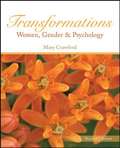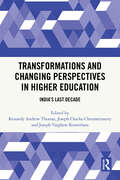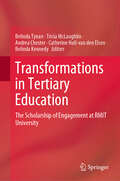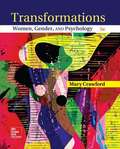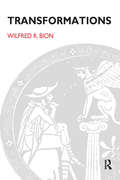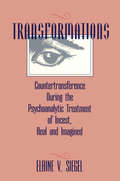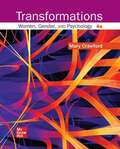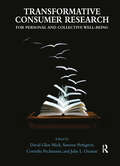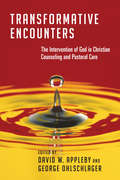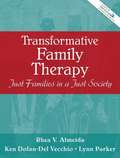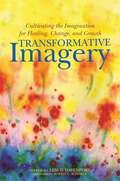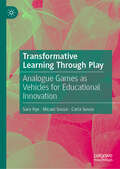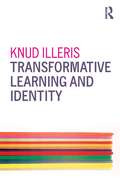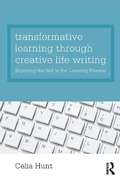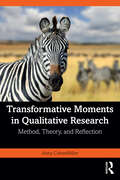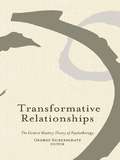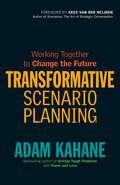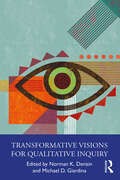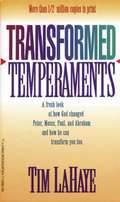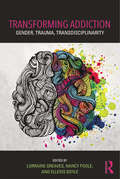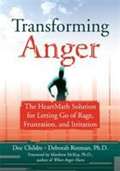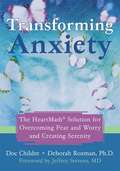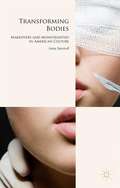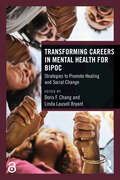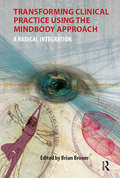- Table View
- List View
Transformations Women: Women, Gender & Psychology (Second Edition)
by Mary CrawfordThis groundbreaking text presents a framework for understanding how the lives of all people are shaped by gender. Instead of presenting gender as a collection of individual traits, Transformations presents gender as a social system that is used to categorise people and is linked to power and status.
Transformations and Changing Perspectives in Higher Education: India's Last Decade
by Joseph Varghese Kureethara Kennedy Andrew Thomas Joseph Chacko ChennattuserryThis book reveals the intricacies of the Indian education system, especially those that surged in the past decade. It covers several perspectives of global higher education, wherein the dynamic trends and frameworks are explicated for a better understanding of the curriculum design and delivery of higher education in India. It facilitates students’ learning and experiences, wherein the post-pandemic insights for learning from remote locations could be gleaned.This volume looks at the complexities in the functioning of educational institutions and suggests novel approaches and interventions that are crucial for the educational framework of India. It attempts to draw theoretical implications of the educational system and uses empirical evidence for recommending actionable processes.As a multidisciplinary work covering international policies and global perspectives on higher education, this book would be useful to students, teachers of education, political science, public administration, international relations, economics, psychology, cognitive science, life skills education, counselling, sociology, gender studies, social work, performing arts, and disaster management. It will also be an indispensable resource for researchers, academicians, professionals, government and policy makers of the country and the world at large.
Transformations in Tertiary Education: The Scholarship of Engagement at RMIT University
by Belinda Tynan Tricia McLaughlin Andrea Chester Catherine Hall-van den Elsen Belinda KennedyThis book presents a collection of papers from RMIT’s annual learning and teaching conference, Transformations in Tertiary Education: The Scholarship of Engagement at RMIT. It discusses innovative curricula and assessments, examines transformative student experiences and showcases examples of curricular and extra-curricular activities to promote and develop intercultural awareness and competence. The book showcases high-quality, innovative papers on promising new directions in tertiary education, representing the breadth and depth of teaching and learning at a leading global Australian university. Authors from Australian and offshore campuses address compelling questions related to curricula, technology, and assessment. Further, they employ a variety of methodological approaches to illustrate 21st century global perspectives on learning and teaching.Readers will be introduced to the complex interrelationships between scholarship and practice, innovative learning design and learning outcomes, and the shifting scholarship roles of the university, the teacher and the learner.
Transformations, Third Edition: Women, Gender and Psychology
by Mary Crawford<P>This edition examines the latest research in the context of a retrograde political climate on such topics as women’s leadership, backlash against competent women, sexual harassment, transgender identity, reproductive justice, and feminist activism.<P> Students are introduced to the concepts of feminism, multiculturalism, diversity and intersexuality.
Transformations: Change From Learning To Growth
by Wilfred R. BionTransformations continues the investigation of various aspects of psychoanalytic theory and practice which the author commenced with Learning from Experience (1962) and pursued in Elements of Psychoanalysis (1963). In this third work published in 1965, the author examines the ways in which the analyst's description of the original analytic experience, mediated by theory, necessarily transforms it in the course of effecting an interpretation.
Transformations: Countertransference During the Psychoanalytic Treatment of Incest, Real and Imagined
by Elaine V. SiegelIn recent years, memories and reconstructions of incestuous child abuse have become common features of psychoanalytic treatment. Among some clinicians, such abuse is suspected even when there is little evidence. How does the analyst distinguish between incest real and imagined, and how do recovered memories of incest affect the analyst? In this poignant and beautifully written study, Elaine Siegel brings new insights to bear on these timely questions. An inveterate note taker, she discloses the countertransferential ruminations and associations to the occurrence of incest at various stages during the treatment process over the course of 30 years of clinical work. The manner in which her "analytic instrument" evolved and was shaped by her analysands' stories makes for a fascinating subtext in a book that addresses itself to the differences and similarities during treatment of real and imagined incestuous abuse. Among the powrfully disturbing clinical cases at the heart of this study are two reports detailing the lengthy analyses of women who found corroboration for multigenerational incest. Siegel also presents two cases in which patients retracted their claims of incest toward the end of their treatments. Through the medium of these and other reports, Siegel explores how psychoanalysts are struggling both to understand incestuous abuse and to accomodate their treatment techniques to shifting societal perspectives.
Transformations: Women, Gender and Psychology
by Mary CrawfordTransformations: Women, Gender and Psychology explores the many transformations, including developmental transformations of a gendered life and transformations in psychology. Transformations presents a broad, comprehensive theoretical framework for understanding how the lives of all people, but particularly the lives of girls and women, are shaped by gender. Students are introduced to the concepts of feminism, multiculturalism, diversity and intersexuality.
Transformative Consumer Research for Personal and Collective Well-Being
by Saskia StachowitschDaily existence is more interconnected to consumer behaviors than ever before, encompassing many issues of well-being. Problems include unhealthy eating; credit card mismanagement; alcohol, tobacco, pornography, and gambling abuse; marketplace discrimination; and ecological deterioration; as well as at-risk groups who are impoverished, impaired, or elderly. Opportunities for well-being via consumer behaviors include empowerment via the Internet, product sharing, leisure pursuits, family consumption, and pro-environmental activities, among others. In 2005 the Association for Consumer Research launched Transformative Consumer Research (TCR). Its mission is to foster research on quality of life that is both rigorous and applied for better assisting consumers, their caregivers, policy administrators, and executives. This edited volume includes 33 chapters on a wide range of topics by expert international authors. All royalties from sales of this book are donated to the Association to support TCR grants.
Transformative Encounters: The Intervention of God in Christian Counseling and Pastoral Care
by George Ohlschlager David W. ApplebyThe Rebuilding of PsychologyInner healingPrayer ministryDeliveranceChristian holismContemplative prayerCognitive-behavioral therapyEmotion-focused therapyGroup therapyForgivenessVisualization and EMDRAddictionLife coaching
Transformative Family Therapy: Just Families in a Just Society
by Lynn Parker Rhea V. Almeida Kenneth Dolan-Del VecchioThis book translates social justice values and multicultural theory into a practical therapeutic model for clinical/community practice. The focus in this work is on linking people across family boundaries to solve common problems, as personal and relational problems are situated in broader social issues, in order to form a healing context
Transformative Imagery: Cultivating the Imagination for Healing, Change, and Growth
by Rachel Naomi Remen Judith Lyons Llewellyn Vaughan-Lee Leslie Davenport Linda Graham Ruth L. Schwartz David Pincus Charlotte Reznick Glenn Hartelius Martin L. Rossman Laury Rappaport Denise Grocke Zhongxian Wu Aftab Omer Alan Morinis Emmett Miller Michael F. Cantwell Carolyn J. Bohler Michael Samuels Bruce Roberts Dean Shrock Gerald Epstein Sondra Barrett Anees A. Sheikh Judith Goleman Phillip Post Brian DietrichGuided imagery is a transformative practice for reducing stress, healing mind and body, and improving performance. This definitive collection brings together leading pioneers in the field of guided imagery to share its theory, practice and history. Readers are introduced to the extensive uses of imagery, from its medical application for pain relief, cancer care and other physical healing, through its significant contribution to mental health and depth psychology, to its application within the arts and as a vehicle for social change. An exploration of the place of imagery within spiritual and religious traditions includes a never before published guide to the internal alchemy of Daoist imagery. Transformative Imagery will enable professionals to tailor guided imagery to their individual practice, demonstrating how to use it with people of all ages, from chronic pain patients to athletes to combat veterans and for both mental and physical health.
Transformative Learning Through Play: Analogue Games as Vehicles for Educational Innovation
by Sara Rye Micael Sousa Carla SousaThis book explores analogue game-based learning in the context of the Anthropocene, addressing an urgent need for educational approaches beyond traditional scholastic boundaries. In the context of a complex world, the book emphasises the inadequacies of current educational methods and the potential of game-based learning to foster collective problem-solving skills. It then traces the historical roots of analogue and tangible games, highlighting their potential and challenges in alignment with several learning theories. The authors explore the psychology of analogue game-based learning, exploring its impact on cognition, motivation and, potentially, skill transfer to real life situations. They focus strongly on designing effective learning games, emphasising principles of game design, the TEGA initiative and common pitfalls to avoid. Ultimately, the book emphasises the importance of inclusivity in game-based learning, addressing barriers, intersectionality, and accessible design features both for commercial and educational games, and highlighting the ethical and pedagogical significance of fostering diverse and inclusive learning environments. The book will be of interest to researchers and students of education-related topics, particularly instructional design, pedagogical, and psychology, as well as enthusiasts from game studies and related practitioners.
Transformative Learning and Identity
by Knud IllerisIn the current ever changing world – the liquid modernity – the most pressing psychological challenge to all of us is to create and maintain a personal balance between mental stability and mental flexibility. In Transformative Learning and Identity Knud Illeris, one of the leading thinkers on the way people learn, explores, updates and re-defines the concept and understanding of transformative learning while linking the concept of transformative learning to the concept of identity. He thoroughly discusses what transformative learning is or could be in a broader learning theoretical perspective, including various concepts of learning by change, as opposed to learning by addition, and ends up with a new, short and distinct definition. He also explores and discusses the concept of identity and presents a general model depicting the complexity of identities today. Building on the work of Mezirow, various perspectives of transformative learning are analysed and discussed, including; transformative learning in different life ages; progressive and regressive transformations; motivation and identity defence; development of identity; personality and competence, and transformative learning in school, education, working life, and in relation to current and future life conditions. This vital new book by one of the leading learning theorists of our time will prove of lasting interest to academics, teachers, instructors, leaders and researchers in the field of adult learning and education. It will also appeal to many students and researchers of psychology and sociology in general. ?
Transformative Learning through Creative Life Writing: Exploring the self in the learning process
by Celia HuntArising from a research project conducted over two years, Transformative Learning through Creative Life Writing examines the effects of fictional autobiography on adult learners’ sense of self. Starting from a teaching and learning perspective, Hunt draws together ideas from psychodynamic psychotherapy, literary and learning theory, and work in the cognitive and neurosciences of the self and consciousness, to argue that creative life writing undertaken in a supportive learning environment, alongside opportunities for critical reflection, has the power to transform the way people think and learn. It does this by opening them up to a more embodied self-experience, which increases their awareness of the source of their thinking in bodily feeling and enables them to develop a more reflexive approach to learning. Hunt locates this work within recent developments in the influential field of transformative learning. She also identifies it as a form of therapeutic education arguing, contrary to those who say that this approach leads to a diminished sense of self, that it can help people to develop a stronger sense of agency, whether for writing or learning or relations with others. Topics covered include: Creative writing as a tool for personal and professional development The transformative benefits and challenges of creative writing as a therapeutic activity The relationships between literary structures and the processes of thinking and feeling The role of cognitive-emotional learning in adult education Collaborative learning and the role of the group This book will interest teachers in adult, further and higher education who wish to use creative life writing as a tool for learning, as well as health care professionals seeking art-based techniques for use in their practice. It will also prove useful to academics interested in the relationship between education and psychotherapy, and in the theory and practice of transformative learning. Additionally, it will appeal to writers seeking a deeper understanding of the creative process.
Transformative Moments in Qualitative Research: Method, Theory, and Reflection
by Anna CohenMillerHave you ever wondered if through your research you could make the world a better place? Have you ever wanted to know more about how others conduct their research? In this groundbreaking book, Anna CohenMiller, multi-award- winning author and educational leader, eloquently fuses powerful stories of research with methodological insight and theory. Each chapter offers a clear, practical and engaging exploration of qualitative inquiry, emphasizing the power of research to foster equity, inclusion and justice-centered practice (e.g., social justice, economic justice, environmental/ ecological justice). Through a collection of captivating and thought-provoking stories from a diverse set of emerging and established scholars, the chapters inspire, challenge and empower readers to consider their own work and practice from research design, to fieldwork, analysis and interpretation, to sharing findings and coalition building and advocacy. The nuanced approach of this accessible text tackles complex issues, inviting readers to reflect on their own research practice and embrace transformative learning, shining a light on the work and experiences of marginalized communities often overlooked in academic discourse. In bringing together creative storytelling modes and methods, such as poetic inquiry, dialogic conversations and reflections across decolonial practice, Indigenous research, participatory youth action research and ecopedagogy, the stories provide a rich tapestry of experiences and perspectives. This book is an invaluable resource and testament to the profound impact of qualitative research for graduate students, practitioners and researchers to enhance their research and praxis. It will appeal to audiences across disciplinary backgrounds including social sciences, educational sciences, humanities and STEM and health fields, encouraging us to embrace the power of research to shape a more inclusive and just world by creating positive change within ourselves, our practice and our research.
Transformative Relationships: The Control Mastery Theory of Psychotherapy
by George SilberschatzThe control-mastery theory, developed by Dr. Joseph Weiss over the second half of the twentieth century, is an attempt to integrate an understanding of how the mind works, how psychopathologies develop, and how psychotherapy can effectively help. Control-Mastery theory assumes that the patient's problems are rooted in the grim, constricting pathogenic beliefs that the patient acquires in the traumatic experiences of childhood. The driving force behind the psychotherapeutic process is the patient's conscious and unconscious desire to recover the capacity to pursue life goals by gaining control and mastering self destructive patterns of thoughts and behaviors. Underlying this theory is the conception that the client structures (both consciously and unconsciously) the psychotherapeutic process in order to clearly and quickly address her own goals. Following this line of thought, the practitioner must be able to identify a client's aims, respond to and encourage these thoughts, and develop a strategic therapeutic plan to effectively address the needs and wants of each individual. This book aims to present the control-mastery theory in a more accessible format, and introduce it to a wider audience, expanding the scope of the theory beyond simply a comparison to Freudian analysis. The text presents an integrated cognitive-psychodynamic-relational approach to therapy, addressing issues surrounding psychopathology and pathogenic constructions. Organized into three distinct sections, the book first considers theoretical underpinnings before moving into in-depth discussions of clinical and practical application of these valuable therapeutic tools and techniques, drawing heavily on detailed descriptions of entire therapy sessions. The final section of the book covers current and developing empirical research, presenting convincing arguments in support of the theory and practice earlier discussed. The editor has extensive research and clinical experience with both the conceptual and practical aspects of the theory, and has worked with Joseph Weiss and Hal Sampson - the two pioneers of the control-mastery approach - who each contributes a chapter to the book. Transformative Relationships advances this integrative approach to therapy beyond its current scope, introducing these valuable concepts and techniques to a wider audience of practitioners of all backgrounds.
Transformative Scenario Planning: Working Together to Change the Future
by Adam Kahane&“Take[s] scenario planning to a new level, beyond the confines of business strategy, to deal with wider social and economic issues.&”—Vince Cable, former Secretary of State for Business, UK People who are trying to solve tough economic, social, and environmental problems often find themselves frustratingly stuck. They can&’t solve their problems in their current context, which is too unstable or unfair or unsustainable. They can&’t transform this context on their own—it&’s too complex to be grasped or shifted by any one person or organization or sector. And the people whose cooperation they need don&’t understand, agree with, or trust them…or each other. Transformative scenario planning is a powerful new methodology for dealing with these challenges. It enables us to transform ourselves and our relationships and thereby the systems of which we are a part. At a time when divisions within and among societies are causing so many people to get stuck and to suffer, it offers hope—and a proven approach—for moving forward together. Praise for Adam Kahane&’s books &“Thought-provoking discourse on handling difficult situations.&”—Publishers Weekly &“Profound . . . a wise way to negotiate our toughest group, community, and societal challenges.&”—William Ury, New York Times–bestselling coauthor of Getting to Yes
Transformative Visions for Qualitative Inquiry (International Congress of Qualitative Inquiry Series)
by Norman K. Denzin Michael D. GiardinaTransformative Visions for Qualitative Inquiry takes as its central theme the idea of transformation, transformative action, transformative possibilities, and potentialities for the future for qualitative inquiry. In a present moment defined by a pandemic of meanings over COVID-19, climate change, political upheaval, inequality, and oppression of all kinds, contributors to this volume seek a new way forward—to reimagine a post-pandemic pedagogy of hope and compassion both for qualitative research and for the communities in which we inhabit. Empathy. Healing. Collaboration. Survival. Discomfort. Protection. Justice. Creative agency. The arts. These are the watchwords for the road ahead. In these uncertain times, leading international scholars from the United States, Canada, and Australia look ahead with a renewed sense of hope, but remain grounded in the reality that much work lies ahead—that our inquiry must meet the demands of our hopeful but evolving future. More specifically, contributors focus on such topics as: academic healing; environmental justice; the hegemony of higher education and challenges to critical education; arts-based research such as songwriting, participatory workshops, and autopoetics; disruptions to conventional humanist and Western modes of thought; and questions of empathy and spirit-writing. Transformative Visions for Qualitative Inquiry is a must-read for faculty and students alike who are interested in imagining new ways to restore healing from the pandemic—to push back, resist, heal, share, laugh, and live.
Transformed Temperaments
by Tim LaHayeAn analysis of Abraham, Moses, Peter, and Paul, whose strengths and weaknesses were made effective when transformed by God.
Transforming Addiction: Gender, Trauma, Transdisciplinarity
by Lorraine Greaves Nancy Poole Ellexis BoyleChoice Highly Recommended Read Addiction is a complex problem that requires more nuanced responses. Transforming Addiction advances addictions research and treatment by promoting transdisciplinary collaboration, the integration of sex and gender, and issues of trauma and mental health. The authors demonstrate these shifts and offer a range of tools, methods, and strategies for responding to the complex factors and forces that produce and shape addiction. In addition to providing practical examples of innovation from a range of perspectives, the contributors demonstrate how addiction spans biological, social, environmental, and economic realms. Transforming Addiction is a call to action, and represents some of the most provocative ways of thinking about addiction research, treatment, and policy in the contemporary era.
Transforming Anger: The Heartmath Solution for Letting Go of Rage, Frustration, and Irritation
by Doc Childre Deborah RozmanFrom the leaders of the renowned HeartMath Institute comes the first anger book to use scientifically proven techniques to transform the body's physical response to anger and show readers how to release and resist angry feelings.
Transforming Anxiety: The HeartMath® Solution for Overcoming Fear and Worry and Creating Serenity
by Doc Childre Deborah RozmanFrom the best-selling authors of Transforming Anger and Transforming Stress comes the first book to apply scientifically proven techniques for engaging with the heart to promote fast and effective relief from anxiety.
Transforming Bodies
by Heike SteinhoffAt the turn of the twenty-first century, American media abound with images and narratives of bodily transformations. Transforming Bodies investigates how these representations have become key sites for the negotiation of power. Focusing on the representations of 'extreme' forms of somatic transformations, particularly cosmetic surgery, this book examines iconic popular cultural texts from diverse media and genres. The reality TV show The Swan, the TV drama series Nip/Tuck, Chuck Palahniuk's(post-)postmodern novels Invisible Monsters and Invisible Monsters Remix, and Scott Westerfeld's young adult fiction series Uglies are read as expressions of the heterogeneous biopolitical discourses that are articulated in the American mediascape. In contemporary American culture, representations of body transformations are often part of a makeover paradigm that presents bodies as 'beautiful,' 'individual' and 'improved' if they adhere to normative constructions of gender, sexuality, class, race/ethnicity, and able-bodiedness. However, Transforming Bodies demonstrates that a number of popular cultural texts take up narrative structures, representational strategies and ideological underpinnings of makeover culture in order to re-write them. These texts link makeovers to images, practices, and narratives of monstrosity and thereby challenge cultural norms. At the crossroads of American, cultural, literary, media, gender, queer, disability and governmentality studies, the book presentsa timely intervention into critical debates on body transformations and contemporary makeover culture.
Transforming Careers in Mental Health for BIPOC: Strategies to Promote Healing and Social Change
by Doris F. Chang Linda Lausell BryantThis book provides targeted advice to Black, Indigenous, and People of Color (BIPOC) in the mental health professions on how to navigate, resist, and transform institutions and policies that were not designed for them.A diverse team of BIPOC leaders reveal their experiences of race-related stress and how they draw on cultural strengths and anti-oppressive frameworks to create more inclusive, equitable, and culturally affirming approaches to mental health training, research, and practice. This book illustrates how it is possible for BIPOC students and professionals to have a career that is more sustainable, allows authenticity to emerge, and sparks transformative change in clients, students, organizations, and society. It addresses the unique professional development needs of BIPOC individuals across different career stages and professional roles. Covering topics such as how to respond to microaggressions from patients, become a media contributor, or step into organizational leadership, each core chapter includes a discussion of the pertinent literature, culturally grounded theories, personal reflections, and actionable strategies for community healing and social change.This essential guide will inspire trainees, practitioners, educators, and administrators in the fields of social work, psychology, counseling, psychiatry, education, and public health, to envision a path toward a more culturally affirming and transformative career.The introduction, chapter 1, and chapter 25 of this book are freely available as downloadable Open Access PDF’s at http://www.taylorfrancis.com.
Transforming Clinical Practice Using the MindBody Approach: A Radical Integration
by Brian BroomThis book assumes that it is no longer tenable to work in healthcare without considering the person as a whole being constituted by a rich weaving of mind, body, culture, family, spirit and ecology. The MindBody approach embraces this 'whole.' But how does it transform clinical practice and training for the clinician and treatment for the patient/client? The book collects together the experiences from a diverse range of clinical practitioners (including psychotherapy, specialist medicine, general practice, physiotherapy, occupational therapy, dietetics, , nursing, and complementary and alternative medicine practitioners) who have deliberately chosen to integrate a MindBody philosophy and skill set in their clinical practices. All reflect deeply on their unique journeys in transforming their clinical encounters. Most have been trained in the dominant Western framework and have inherited the classical dualistic approach which typically keeps mind and body apart.
